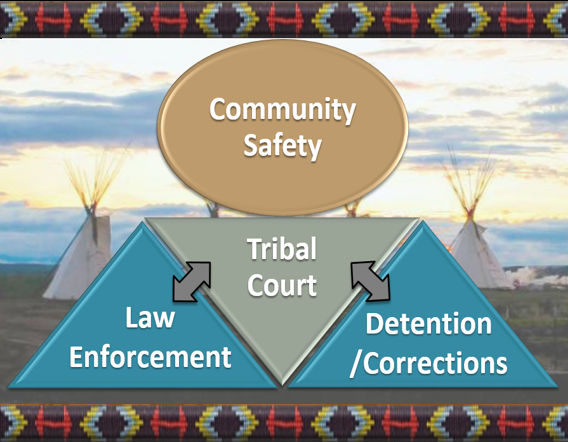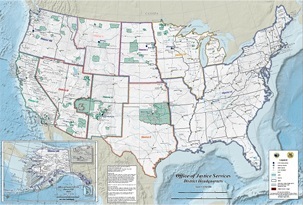Overview:
The mission of the Office of Justice Services (OJS) is to uphold Tribal sovereignty and provide for the safety of Indian communities by ensuring the protection of life and property, enforcing laws, maintaining justice and order, and by ensuring that sentenced American Indian offenders are confined in safe, secure, and humane environments. Ensuring public safety and justice is arguably the most fundamental of government services provided in Tribal communities.
Authority:
Authority to enforce laws, including detention of offenders, is derived from 25 U.S.C. Section 2801 et seq. (Indian Law Enforcement Reform Act), 104 Stat. 473, Pub. L. 101-379, as amended; 124 Stat. 2262, Pub. L. 111-211 (Tribal Law and Order Act).
Authority to further the development, operation, and enhancement of Tribal justice systems and BIA Courts of Indian Offenses is derived from 25 U.S.C. Section 3601 (Tribal Justice Support Act). Section 3611 tasks OJS with three functions:
- Schedule and coordinate independent Tribal court reviews and complete these reviews annually;
- Schedule training and technical assistance to Tribes and tribal organizations focusing on setting up and empowering Tribal courts; and
- Study and conduct research on Tribal justice systems.
Jurisdiction:
The Office of Justice Services holds jurisdiction over crimes committed within Indian Country as defined by 18 U.S.C. '1151(a), (b) & (c) -
- formal [recognized treaty boundaries] & informal [Tribal trust lands] reservations (including rights-of-way/roads),
- dependent Indian communities, & (c) Indian allotments held in trust or restricted status (including rights-of-way/roads).
- where no congressional grant of jurisdiction to state government over the Indian country involved exists.
Programs address major Federal crimes as well as state crimes assimilated into Federal statutes, such as murder, manslaughter, child sexual abuse, kidnapping, rape, assault, arson, burglary, robbery, and the production, sale or distribution of illegal drugs. (Authority: Major Crimes Act - 18 U.S.C. 1153 & state code) Tribal criminal codes are also enforced. (Authority: tribal code or 25 CFR Pt. 11, if a CFR Court of Indian Offenses)
Partnership with the Federal Bureau of Investigation (FBI)
The FBI works in collaboration with Tribal police and other law enforcement agencies, such as OJS, to investigate and enforce laws related to major crimes, such as homicides, kidnappings, and drug trafficking, that occur within its jurisdiction on Tribal lands. The FBI has special jurisdiction to investigate crimes committed on about 200 reservations nationwide. The FBI derives its jurisdiction primarily from two federal laws: the General Crimes Act and the Major Crimes Act, although there are other federal laws that provide further direction. Tribal law enforcement often handle matters related to tribal codes and regulations.
Three conditions must be met for the FBI to investigate an alleged crime on a reservation:
- The investigation must be predicated on a criminal act for which the FBI has jurisdiction—this includes crimes that would not fall under FBI jurisdiction if they occurred outside of a reservation.
- The crime must have occurred on a reservation where the FBI has jurisdiction.
- The subject, victim, or both, must be American Indian and Alaska Natives (AIAN).
The Violence Against Women Act (VAWA) has empowered tribes to further address cases of violence against Indigenous women and girls, and gives them greater authority to incarcerate individuals. A better understanding of the prevalence of such violence—and the effectiveness of the current law enforcement response to it—can help improve future responses to these issues.
Providing Community Safety in Indian country

OJS Field Programs:
Field programs are comprised of the services provided at the local level (along with management oversight) directly by OJS personnel or by a Tribe through a self-determination contract or compact. These include Uniform Police, Criminal Investigation, Dispatch, and Corrections, and are managed geographically through 9 OJS districts. From its headquarters in Washington DC, down through the OJS chain of command to the local level, field program personnel integrate key national goals and priorities into consistent implementation of policies and practices.
Uniform Police Officers are generally responsible for patrolling designated service areas and responding to a wide range of calls for service. Criminal Investigators are primarily responsible for conducting investigations of criminal activity, and Dispatch personnel function as the critical communication link between the public and emergency response personnel. Together, these three programs represent the law enforcement component of justice systems in nearly 200 Indian communities.
Another fundamental component of local public safety is administered by the OJS Corrections program which oversees, or directly operates, more than 90 detention centers throughout Indian Country. Running these facilities in a safe, secure, and humane manner requires correctional supervisors and officers, armed transport officers, and cooks.
The third essential piece of tribal justice systems is the Tribe’s court. Throughout Indian Country, the vast majority of courts are run by Tribal governments through self-determination agreements executed with BIA regional offices rather than OJS. However, there are a handful of Courts of Indian Offenses, or “CFR Courts” that the BIA operates directly on behalf of the Tribe. OJS works with the BIA regional program staff to provide technical assistance and supplemental funding to the tribal and CFR courts on an annual basis.
Unlike the program areas covered by the Offices of Indian Services and Trust Services, whose programs are administered through the BIA regional office structure, all law enforcement and corrections programs are administered through the OJS line of authority and its nine district structure. This is because federal law mandates supervision of law enforcement personnel exclusively to other law enforcement personnel up through the Deputy Bureau Director, Justice Services. In total, OJS funds just over 800 federal positions and twice as many Tribal positions to help address the public safety and justice needs of tribal communities each year.
Other OJS Functions:
As the exclusive federal entity charged with maintaining law and order on Indian reservations, the OJS has several supporting operations and functions, which include drug enforcement, victim assistance, emergency management, inspections and internal affairs, land mobile radio program, Indian highway safety, tribal justice support, and operation of the Indian Police Academy.
Responsibilities of the OJS drug enforcement program include managing investigations and implementing interdiction programs to reduce drug use, distribution, and drug related crime throughout Indian Country. Agents perform activities that include conducting complex criminal investigations, carrying out surveillance of criminals, infiltrating drug trafficking networks, developing and implementing undercover techniques, executing search warrants, confiscating illegal drug supplies, and collecting and processing evidence. OJS drug enforcement efforts also include an intelligence gathering and analysis component and K-9 drug detection operations.
The victim services program provides assistance to victims and witnesses who are involved with criminal prosecutions in Tribal or Federal courts within Indian country during the investigative stages of violent and/or drug crimes, which is critical to the success of many investigations. The program focuses on ensuring that victims are afforded their rights under the Crime Victims’ Rights Act of 2004 as required for Federal law enforcement agencies. This program provides direct services and follow-up services to victims and their families during their interaction with the criminal justice system.
The OJS inspections program conducts operational and physical security inspections and audits of Bureau of Indian Education (BIE) schools and BIA Federal buildings. The Internal Affairs Division conducts investigations of officer involved shootings and in-custody deaths that occur in Indian country. This oversight function emphasizes standardization and professionalism of BIA and Tribal law enforcement, criminal investigations and corrections programs. Program staff also conduct annual audits on Federal investigative case files, detention program reviews, police program reviews, and law enforcement facility vulnerability assessments.
Reliable land mobile radio communication systems are vital in supporting program functions and ensuring public safety within Indian country. Land mobile radio is the backbone of wireless communication that enables public safety, education, public works, and wildfire programs to remain in constant contact. This program supports the repair and replacement of radio equipment installed in hundreds of BIA vehicles across the nation, as well as hundreds of hand-held radio units, all used in primarily remote locations with limited or no cell phone coverage.
The Indian Highway Safety Program (IHSP) administers U.S. Department of Transportation grant funding to assist federally recognized Indian Tribes in implementing traffic safety projects on Indian reservations in the United States. The program operates under the authority of The Highway Safety Act of 1966, USC Title 23, Section 402, with oversight provided by the National Highway Traffic Safety Administration.
The Office of Tribal Justice Support was established within OJS to further the development, operation, and enhancement of tribal justice systems and BIA Courts of Indian Offenses. The office regularly provides tribal courts with technical assistance in the fields of pre-trial, probation, alternative sentencing, family matter issues including domestic violence, Indian Child Welfare Act (ICWA), juvenile issues, victim witness issues, probate matters, contract matters, and matters of economic development including contract issues and Uniform Commercial Codes legislated by tribal governments. This program’s main function is to conduct assessments and document the needs of tribal courts across Indian Country, including both Tribal communities where tribes have criminal jurisdiction and also in those states where criminal jurisdiction has been remanded to the state by statute. A uniform Tribal court review process is the fundamental mechanism used by this program to assess Tribal court processes overall, as well as in relation to specific matters such as Indian Child Welfare Act (ICWA) and probate.
The Indian Police Academy is located at the Department of Homeland Security Federal Law Enforcement Training Center at Artesia, New Mexico and provides basic police, criminal investigation, telecommunications, and detention training programs to personnel serving both direct service and Tribally operated BIA funded law enforcement programs. Numerous advanced courses are offered as well, including child abuse investigation; domestic violence investigation; sex crime investigation; field training officer certification; management/leadership; peer support/critical incident debriefing; community policing; and drug investigation. These essential training courses are funded within the IPA’s budget and offered at no cost to tribal and BIA public safety personnel throughout the year.
At the national level, the Office of Justice Services functions as a lead Federal stakeholder and advocate for public safety and justice matters affecting hundreds of Tribal communities across the country. We engage regularly with other stakeholders such as OMB, DOJ, the Congress, and Tribal governments to collaborate on how best to help address the unique public safety challenges faced by Tribes.
BIA Office of Justice Services
These are the official social media accounts for the Bureau of Indian Affairs' Office of Justice Services.
Mailing Address
Office of Justice Services Headquarters
1849 C Street NW
MS-3662-MIB
Washington, DC 20240
United States

Related Links
- Not Invisible Act of 2019 Section 3 Report
- OJS Documents and Reports
- Indian Affairs FOIA Request
- Submit a tip or case info for a missing or murdered person
- Report tip for illegal drug activity
- BIA, FBI agreement for the administration of criminal investigations in Indian …
- WHCNAA Committee on Public Safety and Justice


